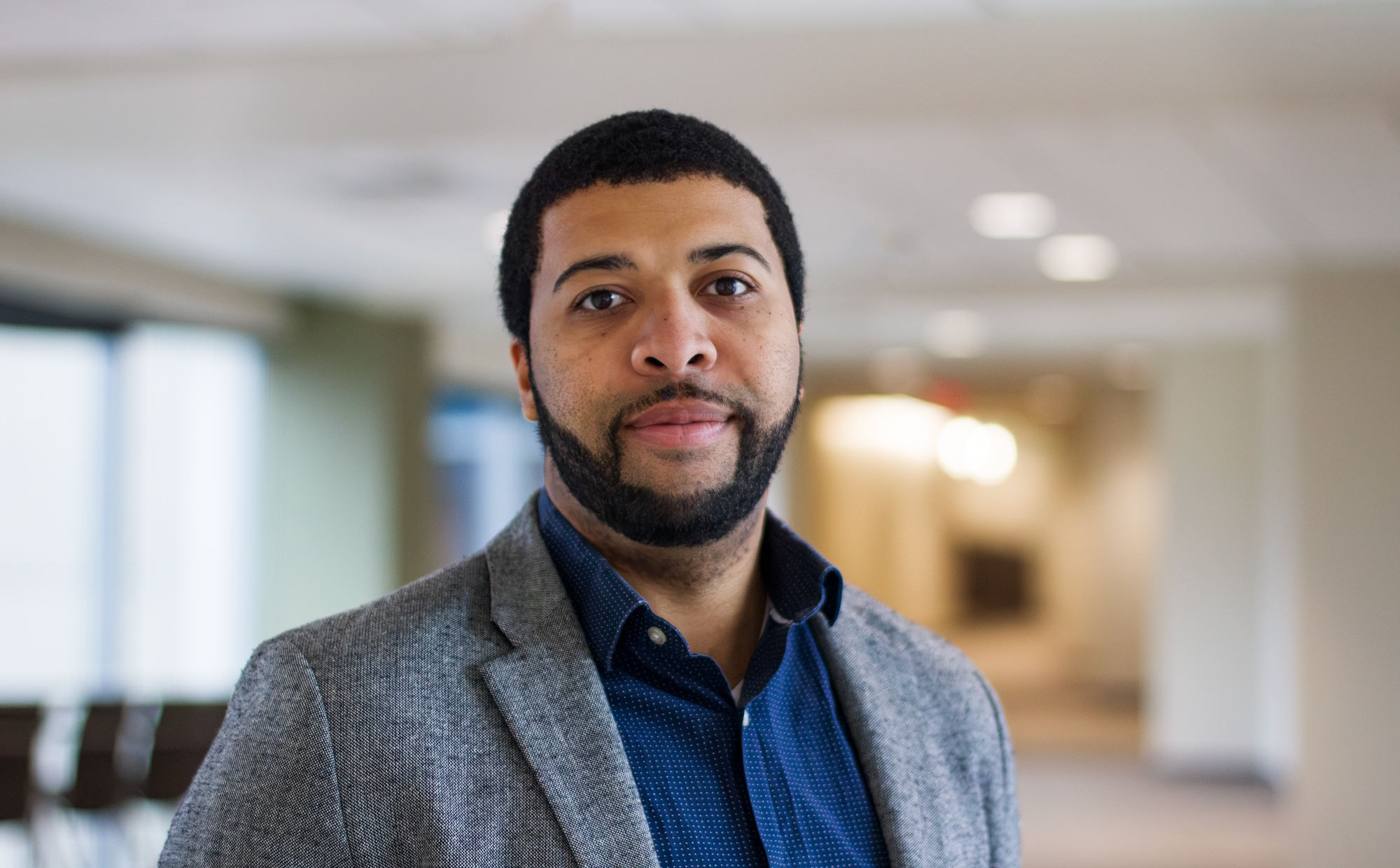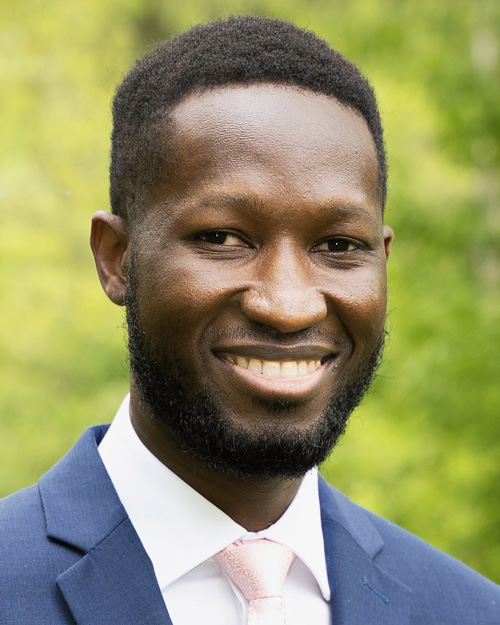Guillory wins We Care Fund award to address Neointimal Hyperplasia after Cardiac Stenting
Oct 15, 2025
 Dr. Roger Guillory II, PhD, Assistant Professor in the Marquette–MCW Joint Department of Biomedical Engineering, and Dr. Momodou Jammeh have been awarded a seed grant from the We Care Fund for Medical Innovation and Research for the project titled “Bioabsorbable Magnesium Alloy Scaffolds: A Novel Approach to Reducing Restenosis after Endovascular Intervention.” The team will address one of the most significant opportunities in cardiovascular intervention recovery: reducing neointimal hyperplasia after stent placement. Neointimal hyperplasia is a phenomenon occurring after vascular intervention, where swelling causes irregular cell growth on the inner lining, or intima, of the vascular wall. This irregular growth is the leading cause of early stent failure, as the irregular cells often recreate the blockage the stent was introduced to overcome.
Dr. Roger Guillory II, PhD, Assistant Professor in the Marquette–MCW Joint Department of Biomedical Engineering, and Dr. Momodou Jammeh have been awarded a seed grant from the We Care Fund for Medical Innovation and Research for the project titled “Bioabsorbable Magnesium Alloy Scaffolds: A Novel Approach to Reducing Restenosis after Endovascular Intervention.” The team will address one of the most significant opportunities in cardiovascular intervention recovery: reducing neointimal hyperplasia after stent placement. Neointimal hyperplasia is a phenomenon occurring after vascular intervention, where swelling causes irregular cell growth on the inner lining, or intima, of the vascular wall. This irregular growth is the leading cause of early stent failure, as the irregular cells often recreate the blockage the stent was introduced to overcome.
Dr. Guillory specializes in the design of a new wave of cardiovascular intervention technology—bioabsorbable stents. Bioabsorbable stents are designed hold the vascular wall open long enough to heal but then degrade, allowing them to eventually be fully absorbed into the body. Bioabsorbable materials have been shown to reduce inflammation when compared to permanent materials, as the permanent nature may cause indefinite irritation. The magnesium-based bioabsorbable stents—which are the preferred variation of metals-based bioabsorbable stents both per structural stability and degradation profile—show additional promise, as the magnesium introduced as part of the degradation of the stent scaffolding may act as an anti-restenotic agent, thereby reducing resultant irregular cell growth.
 To further extend the concept of eluted magnesium resulting in lower restenosis, Drs. Guillory and Jammeh will investigate how advanced surface engineering can control the degradation rate of magnesium-based bioabsorbable stents. This allows for the optimization of an as-of-yet under-investigated opportunity in bioabsorbable stent design—the capacity for the degrading scaffold to act as a drug delivery vehicle, thus reducing neointimal hyperplasia. The findings stand to improve the outcomes of cardiovascular intervention for countless patients and could inform the design of next-generation bioresorbable implants for broader clinical applications for decades to come.
To further extend the concept of eluted magnesium resulting in lower restenosis, Drs. Guillory and Jammeh will investigate how advanced surface engineering can control the degradation rate of magnesium-based bioabsorbable stents. This allows for the optimization of an as-of-yet under-investigated opportunity in bioabsorbable stent design—the capacity for the degrading scaffold to act as a drug delivery vehicle, thus reducing neointimal hyperplasia. The findings stand to improve the outcomes of cardiovascular intervention for countless patients and could inform the design of next-generation bioresorbable implants for broader clinical applications for decades to come.
Dr. Roger Guillory is the director of the Regenerative Engineered Biomaterials Lab, with research interests that include cellular and molecular interactions of bioactive materials, bioabsorbable materials, and engineering biomaterials for medical devices. He has recently received funding from MCW's Cardiovascular Research Center to study the impact of serum lipid profiles on bioabsorbable magnesium degradation, as well as a R35 Grant from the National Institutes of Health—National Institute of General Medical Sciences, for a project looking to clarify the tissue-material interface of bioabsorbable metals in order to maximize tissue regeneration.
Dr. Guillory will be joined on this project by Dr. Momodou Jammeh, an Assistant Professor in the Department of Vascular Surgery at the Medical College of Wisconsin and a clinician at Froedtert Hospital. The project is sponsored by the The We Care Fund, which provides seed funding to support innovative medical research and clinical programs, helping researchers accelerate discoveries in areas such as cancer, cardiovascular disease, gastrointestinal conditions, neonatal and pediatric care, organ transplantation, and trauma.
Learn more about Dr. Guillory

 Dr. Roger Guillory II, PhD,
Dr. Roger Guillory II, PhD,  To further extend the concept of eluted magnesium resulting in lower restenosis, Drs. Guillory and Jammeh will investigate how advanced surface engineering can control the degradation rate of magnesium-based bioabsorbable stents. This allows for the optimization of an as-of-yet under-investigated opportunity in bioabsorbable stent design—the capacity for the degrading scaffold to act as a drug delivery vehicle, thus reducing neointimal hyperplasia. The findings stand to improve the outcomes of cardiovascular intervention for countless patients and could inform the design of next-generation bioresorbable implants for broader clinical applications for decades to come.
To further extend the concept of eluted magnesium resulting in lower restenosis, Drs. Guillory and Jammeh will investigate how advanced surface engineering can control the degradation rate of magnesium-based bioabsorbable stents. This allows for the optimization of an as-of-yet under-investigated opportunity in bioabsorbable stent design—the capacity for the degrading scaffold to act as a drug delivery vehicle, thus reducing neointimal hyperplasia. The findings stand to improve the outcomes of cardiovascular intervention for countless patients and could inform the design of next-generation bioresorbable implants for broader clinical applications for decades to come. 